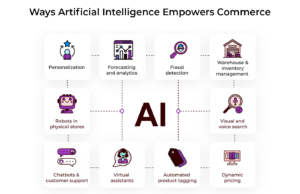With the rise of online shopping, customers are spoiled for choice, and their expectations are higher than ever. To stay ahead of the competition, you need to be able to anticipate their needs, preferences, and behaviors. But, with millions of data points and complex customer journeys, it’s becoming increasingly difficult to get a clear picture of your customer. This is where AI-driven insights come in – a game-changing technology that can help you uncover hidden patterns, identify new opportunities, and create personalized experiences that drive loyalty and revenue. In this post, we’ll explore the power of AI-driven insights in ecommerce and show you how to harness them to revolutionize your customer-centric strategy and stay ahead of the curve.
Unlocking the power of customer data

Every interaction a customer has with your online store generates valuable data – purchase history, browsing behavior, search queries, and even abandoned carts. While this data holds immense potential, manually analyzing it can be a time-consuming and overwhelming task. AI, however, transforms this data into actionable insights, empowering you to:
- Uncover hidden patterns: AI algorithms can sift through massive datasets, identifying subtle patterns and trends that might escape the human eye. This can reveal hidden customer preferences, buying habits, and areas for improvement across your online store.
- Predict customer needs: By analyzing past behavior and market trends, AI can anticipate what products customers are likely to be interested in next. This allows you to personalize product recommendations, showcase relevant upsells and cross-sells, and ultimately guide customers towards a fulfilling shopping experience.
- Segment your audience: AI can help you segment your customer base into distinct groups based on demographics, interests, and purchase history. This targeted approach allows you to craft personalized marketing campaigns and messaging that resonate deeply with each segment, maximizing the effectiveness of your marketing efforts.
- Identify friction points: AI can analyze customer behavior throughout their shopping journey, pinpointing areas where they might encounter frustration or confusion. This empowers you to optimize your website layout, streamline the checkout process, and address any pain points that could hinder conversions.
5 ways to use AI-driven insights to boost your ecommerce strategy

The ecommerce battlefield is a dynamic one, and understanding your customers is the ultimate weapon. AI-powered insights are the key to unlocking this knowledge, empowering you to make data-driven decisions that propel your business forward. Here are 5 ways AI can revolutionize your ecommerce strategy:
- Identifying high-value Segments
Traditionally, customer segmentation relied on demographics or purchase history. AI takes it a step further. By analyzing vast amounts of data, AI algorithms can identify hidden patterns, revealing distinct customer segments with unique characteristics and buying behaviors. This allows you to:
- Focus marketing efforts: Target high-value customer segments with laser precision. Tailor your marketing campaigns and messaging to resonate with their specific needs and preferences, maximizing campaign effectiveness and return on investment (ROI).
- Craft personalized loyalty programs: Develop targeted loyalty programs that cater to the buying habits of each segment. This fosters a sense of exclusivity and incentivizes repeat business.
- Personalizing the shopping experience
Gone are the days of generic marketing blasts. Customers crave personalized experiences that cater to their individuality. AI provides the key:
- Dynamic product recommendations: AI analyzes customer data to recommend products they’re likely to be interested in, based on browsing history, past purchases, and even abandoned carts. This increases customer satisfaction, conversion rates, and average order value.
- Real-time chatbots: AI-powered chatbots provide 24/7 customer support, answer frequently asked questions, and offer personalized product recommendations during the shopping journey. This enhances customer experience, builds trust, and reduces the burden on your support team.
- Optimizing product suggestions
Imagine a world where your product recommendations are like mind-reading – suggesting exactly what a customer needs. AI makes this a reality.
- Predictive analytics: AI analyzes purchase history, browsing behavior, and market trends to predict future customer needs. This allows you to showcase products they might be interested in before they even know it, driving impulse purchases and increasing sales.
- A/B testing: AI can help you A/B test different product recommendation algorithms and layouts to identify what resonates best with your audience. This data-driven approach ensures you’re delivering the most relevant recommendations possible.
- Streamlining supply chain operations
AI doesn’t just improve customer-facing aspects of your business. It can also revolutionize your back-end operations:
- Demand forecasting: By analyzing historical sales data and market trends, AI can predict future demand for your products. This allows you to optimize inventory levels, minimize stockouts, and ensure you have the right products in stock at the right time. This translates to reduced costs, improved customer satisfaction, and a smoother overall operation.
- Dynamic pricing: AI can monitor competitor pricing and market fluctuations, allowing you to adjust your pricing strategies in real-time. This ensures you remain competitive while maximizing your profit margins.
- Predicting the future
Customer churn is a constant challenge in ecommerce. AI can help you stay ahead of the curve:
- Churn prediction: AI algorithms can analyze customer behavior to identify customers at risk of churning. This allows you to take proactive steps to win them back with targeted promotions, loyalty program incentives, or personalized outreach campaigns.
- Retention strategies: Understanding the reasons behind customer churn, can develop targeted retention strategies to address those pain points and keep your customers happy.
The future of ecommerce: Powered by AI and customer centricity
The future of ecommerce is undoubtedly customer-centric, and AI is the key that unlocks this potential. By embracing AI-driven insights, you gain the power to:
- Make data-driven decisions: Move beyond guesswork and base your ecommerce strategy on concrete data and customer insights.
- Optimize every aspect of your business: From marketing and sales to customer service and operations, AI empowers you to optimize every facet of your online store.
- Build stronger customer relationships: By understanding your customers on a deeper level, you can build stronger relationships, foster loyalty, and drive repeat business.
Embracing AI in your ecommerce strategy
The good news is that AI-powered tools are becoming increasingly accessible and affordable for ecommerce businesses of all sizes. Here are some steps you can take to get started:
- Identify your goals: Define what you want to achieve with AI-driven insights. Is it improving customer personalization, optimizing inventory management, or streamlining marketing campaigns?
- Explore AI tools: Research various AI-powered tools available that cater to your specific needs and budget. Many offer free trials or demo versions.
- Start small: Don’t try to overhaul your entire ecommerce strategy overnight. Begin by implementing AI in a specific area, such as product recommendations or churn reduction efforts. This allows you to learn the ropes and measure the impact before scaling up.
- Integrate with existing systems: Ensure the AI tool you choose integrates seamlessly with your existing ecommerce platform and customer relationship management (CRM) system. This creates a unified data flow for a holistic view of your customer base.
- Invest in your people: AI is a powerful tool, but it doesn’t replace human expertise. Train your team on how to interpret AI-generated insights and leverage them to make informed decisions that benefit your business and your customers.
Real-life examples of AI-driven insights in ecommerce
The power of AI-driven insights in ecommerce is not just a theoretical concept, but a tangible reality that has already been successfully implemented by numerous businesses. Take, for example, the story of a fashion retailer that used AI-powered customer segmentation to identify a specific group of high-value customers who were likely to purchase luxury items. In creating targeted marketing campaigns and personalized product recommendations, they were able to increase sales among this group by 25%. Another example is an online electronics store that leveraged AI-driven sentiment analysis to identify and respond to customer complaints on social media, resulting in a 30% reduction in negative reviews and a significant improvement in customer satisfaction. These real-life examples demonstrate the ability of AI-driven insights to revolutionize ecommerce strategy, driving revenue growth, improving customer experience, and gaining a competitive edge in the market.
Conclusion
In today’s fast-paced ecommerce landscape, understanding your customer is crucial to driving sales, increasing loyalty, and staying ahead of the competition. Using the AI-driven insights, you can gain a deeper understanding of your customers’ needs, preferences, and behaviors, and use this information to revolutionize your ecommerce strategy. With the power of AI, you can create personalized experiences, optimize your marketing efforts, and improve customer satisfaction. The possibilities are endless, and the benefits are undeniable. Embracing AI-driven insights can transform your ecommerce business into a customer-centric powerhouse, driving growth, revenue, and long-term success. Don’t just guess what your customers want – know them inside and out, and use that knowledge to create a shopping experience that will leave them coming back for more.

